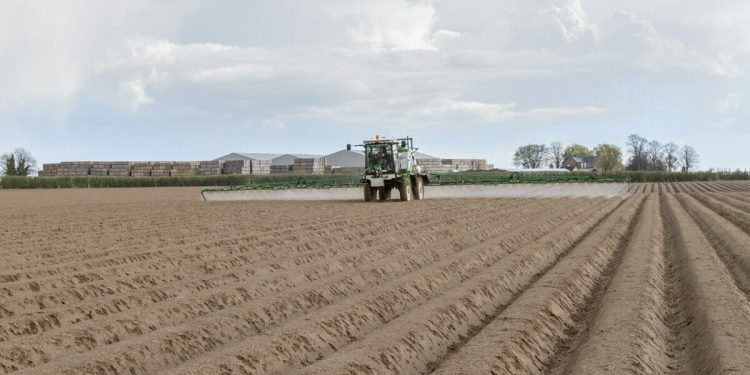Many growers experienced an April to rival one of the driest on record (1938 and 1974 both saw less than 15mm of rain on average in the UK). Potato growers have been planting into dry and also colder soil conditions than what is ideally preferred for this time of year.

The dry cold soil will add to the pressures of timely weed control add another dimension to the challenges of good crop establishment this season.
How will the cold spring affect potato crop weed control?
The exceptionally dry weather at planting this spring 2021 may mean that pre-emergence herbicides are likely to give poor control. Growers have been forced into planting into soil temperatures below the optimum 8-10 degrees c.
How can potato growers control weeds after a cold spring?
Good weed identification and field knowledge is critically important in terms of choosing which active substance to use; as well as the timing when it comes to being used as part of a successful weed management strategy. Poor weed control impacts on yields yield losses of up to 80%. Competition from weeds leads to poor performing potato crops and can also cause quality issues in terms of competition for water for example, as well as providing the “green bridge” for other pests and diseases to survive and enter into the growing potato crop.
Non-chemical weed control options for potato crops
- Weed mapping
- Mechanical approaches such as ridge cleaning
- Hand or laser weeding in-crop
- Flame weeding

All these suggestions are great but in practice can be time consuming and labour intensive and could incur costs in terms of new machinery outlays. That said, adapting such strategies could play an integral part in the potato growers weed management strategy in the future as the number of approved herbicide active substances continue to decline.
Chemical weed control in potato crops
The standard approach would be to use a primary method of weed management by means of a pre emergence residual herbicide application, followed up by a post emergence application where necessary with rimsulfuron for example.
What are the challenges of applying a herbicide to potato crops in dry conditions (pre and post emergence)?
As with any pre-emergence herbicide application, moisture plays an integral part in successful weed management. Excessive rainfall in particular in lighter or stonier soils can translocate the active substances in the pre emergence herbicide application down into the potato ridge and thus damage the emerging plant. The reverse of this is that in dry conditions, the active substance can just sit on the surface of the soil profile and end up being an ineffective but costly application.
There are ways of dealing with this issue such as either splitting the residual component from the contact element of the pre-emergence application or by delaying timings to just before “cracking”; when the new emerging plant is just about to push up through the soil profile. The threat here is that if applied and there is a prolonged period of dry weather and then a flash of rain at the wrong time and this could result in crop damage to the emerging plant not to mention the trigger for any weed seeds to germinate.
Weed control in potato crops – following on-label advice
Often the herbicide label states application at no more than 10% emergence. This provides the challenge in that potatoes can emerge very quickly and if applied too late you could see some effects on tubers.
The use of pre emergence residual herbicides can be supported by a post emergence application of selected contact herbicides. However optimum residual herbicide efficacy is aided by application to damp rather than dry soil.
An example of a pre-emergence herbicide mix is prosulfocarb, metribuzin + pyraflufen-ethyl which is capable of achieving control of key potato weeds. It has been noted that a higher rate of prosulfocarb can achieve longer persistence of residual activity in particular for grass weed control.
Herbicide trials at Strategic Potato Farms
AHDB strategic Potato Farms have provided an excellent platform for exploring the options of pre and post-emergence weed control.
View results of Strategic Potato Farm weed control trials here.






